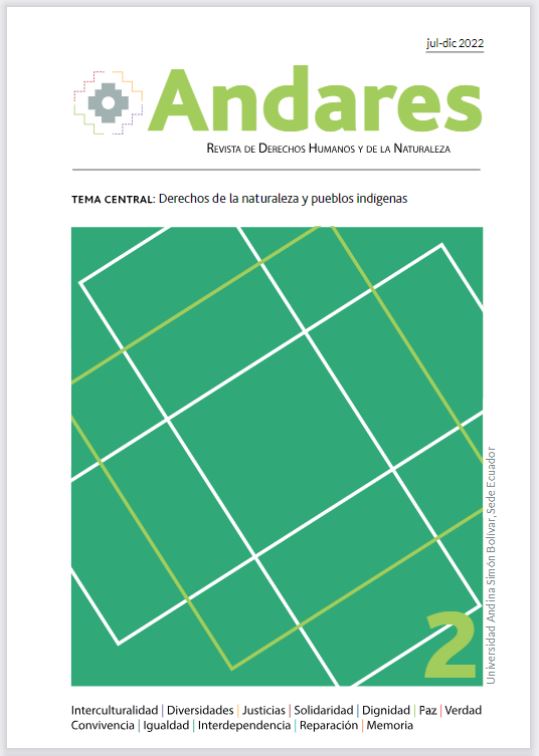The Principles of Compulsory Legislative Regulation (Reserva de Ley) and Legal Certainty as Mechanisms to Defend Rights of Nature in the Ecuadorian Constitution: A Study of the Constitutional Court Rulings No. 32-17-IN/21 and No. 22-18-IN/21
DOI:
https://doi.org/10.32719.29536782.2022.2.1Keywords:
Ecuador, rights of nature, legal certainty, responsibilities of legislator, participative democracyAbstract
The recognition of rights of nature is one of the most innovative aspects of the current Constitution of Ecuador and has attracted the attention of lawyers all over the world. This especially since 2019, when the Constitutional Court of Ecuador began to systematically
concretize the abstract constitutional terms and examine the relation between rights of nature and other constitutional rights and guarantees. This paper aims to contribute to the latter by analyzing the constitutional guarantee of compulsory legislative (instead of e.g. administrative) regulation (reserva de ley) and the right to legal certainty and its role in defending rights of nature. After having introduced both constitutional concepts, the article proceeds to examine the Constitutional Court judgements n.° 32-17-IN/21 y n.° 22-18-IN/21 (Mangrove Case) focusing on the guarantee of compulsory legislative regulation (reserva de ley) and legal certainty as means to protect rights of nature. It is shown, that through the discussed constitutional concepts the Constitutional Court of Ecuador has limited the administrative regulation of rights of nature appealing to the responsibility of the legislator in matters of fundamental constitutional relevance, among them, rights of nature. The paper concludes that Constitutional Court of Ecuador thereby not only defends rights of nature but also strengthens participative democracy.
Downloads
References
Acosta, Alberto, y Esperanza Martínez, eds. Derechos de la naturaleza: El futuro es ahora. Quito: Abya-Yala, 2009.
Arcentales, Javier. “De objeto a sujeto de derechos: La naturaleza en la jurisprudencia de la Corte Constitucional del Ecuador”. Ecuador Debate 116 (2022): 59-74. https://bit.ly/3Gvrdqe.
Ávila Santamaría, Ramiro. “La teoría sistémica del derecho en la jurisprudencia de la Corte Constitucional”.
Ecuador Debate 116 (2022): 127-38. https://bit.ly/ 3Gvrdqe.
Berros, María Valeria. “Defending Rivers: Vilcabamba in the South of Ecuador”. RCC Perspectives 6 (2017): 37-44. https://bit.ly/3EIzeqH.
Ecuador. Código Orgánico del Ambiente. Registro Oficial Suplemento 983, 12 de abril de 2017.
—. Constitución de la República del Ecuador. Registro Oficial 449, 20 de octubre de 2008.
—. Decreto Ejecutivo 95. Registro Oficial 494, Cuarto Suplemento, 14 de julio de 2021.
—. Decreto Ejecutivo 151. Registro Oficial 512, Sexto Suplemento, 10 de agosto de 2021.
—. Ley de Minería. Registro Oficial Suplemento 517, 29 de enero de 2009.
—. Ley Orgánica de Recursos Hídricos, Usos y Aprovechamiento del Agua. Registro Oficial Suplemento 305, 6 de agosto de 2014.
Ecuador Corte Constitucional. “Sentencia n.° 002-14-SINCC”. Caso n.° 0056-12-IN y 0003-12-IA acumulados. 14 de agosto de 2014.
—. “Sentencia n.° 016-10-SEP-CC”. Casos n.° 0092-09-EP y 0619-09-EP acumulados. 29 de abril de 2010.
—. “Sentencia n.° 22-13-IN/20”. Caso n.° 22-13-IN. 9 de junio de 2020.
—. “Sentencia n.° 33-20-IN/21 y acumulados”. Caso n.° 33-20-IN y acumulados. 5 de mayo de 2021.
—. “Sentencia n.° 32-17-IN/21”. Caso n.° 32-17-IN. 9 de junio de 2021.
—. “Voto salvado Corral: Sentencia n.° 32-17-IN/21”. Caso n.° 32-17-IN, 9 de junio de 2021.
—. “Sentencia n.° 22-18-IN/21”. Caso n.° 22-18-IN (Caso Manglares). 8 de septiembre de 2021.
—. “Voto salvado Andrade y Salazar: Sentencia n.° 22-18-IN/21”. Caso n.° 22-18-IN (Caso Manglares). 8 de septiembre de 2021.
—. “Sentencia n.° 1149-19-JP/21”. Caso n.° 1149-19-JP/20 (Los Cedros). 10 de noviembre de 2021.
—. “Sentencia n.° 2167-21-EP/22”. Caso n.° 2167-21-EP (Río Monjas). 19 de enero de 2022.
—. “Sentencia n.° 253-20-JH/22”. Caso n.° 253-20-JH (Mona Estrellita). 27 de enero de 2022.
Ecuador Corte Constitucional para el Período de Transición. “Sentencia n.° 001-10-SIN-CC”. Caso n.° 0008-09-IN y 0011-09-IN (acumulados). 18 de marzo de 2010.
Ecuador Corte Provincial de Imbabura. “Sentencia”. Proceso n.° 10332-2018-00640. 10 de julio de 2019.
Ecuador Ministerio del Ambiente. Reglamento Ambiental de Actividades Mineras. Registro Oficial Suplemento 213, 27 de marzo de 2014.
Encalada, Andrea. “Funciones ecosiste?micas y diversidad de los ri?os: Reflexiones sobre el concepto de caudal ecolo?gico y su aplicacio?n en el Ecuador”. Polémika 2, n.° 5 (2010): 40-7. https://bit.ly/3UKEQWM.
España Tribunal Constitucional. “Sentencia n.° 292/2000”. Caso n.° 1.463/2000. 4 de enero de 2001.
FAO. “Restauracio?n y gestio?n del ecosistema de manglares”. FAO. Accedido 18 de noviembre de 2022. https://bit.ly/3EKPFCQ.
Kersten, Jens. “Who Needs Rights of Nature?”. RCC Perspectives 6 (2017): 9-14. https://bit.ly/3TGglsw.
Melo, Mario. “La nueva ronda petrolera y el derrumbe del paradigma constitucional”. En Horizonte de los derechos humanos: Ecuador 2012, editado por Gina Benavides y Gardenia Chávez, 103-17. Quito: Universidad Andina Simón Bolívar, Sede Ecuador, 2013.
Oyarte, Rafael. Derecho constitucional. Quito: Corporación de Estudios y Publicaciones, 2019.
Schröter, Michael, y Klaus Bosselmann. “Die Robbenklage im Lichte der Nachhaltigkeit”. Zeitschrift für Umweltrecht 29, n.° 4 (2018): 195-205.






